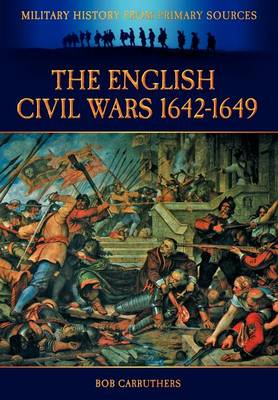Military History From Primary Sources
6 total works
This is the definitive military history of the Civil Wars which swept the British Isles from 1642 to 1649. The martial aspects of the wars are covered in detail along with a comprehensive overview of the religious and political dimensions which shaped the armies involved in the conflict. This excellent single volume history is the perfect introduction to the military history of this turbulent decade which shaped the destiny of the British Isles. This book is part of the 'Military History From Primary Sources' series, a new military history range compiled and edited by Emmy Award winning author and historian Bob Carruthers. The series draws on primary sources and contemporary documents to provide a new insight into the true nature of warfare. The series consultant is David Mcwhinnie, creator of the award winning PBS series 'Battlefield'.
The Athenian Thucydides (c490-395BC) wrote this history of the Peloponnesian War between the Spartans and the Athenians, believing that it would be a greater war than any that had preceded it, and his version of events would serve as "a possession for all time". The fragmentary nature of ancient Greece increased the frequency of conflict, but conversely limited the scale of warfare. Unable to maintain professional armies, the city-states relied on their own citizens to fight, reducing the potential duration of campaigns. The rise of Athens and Sparta as preeminent powers, however, led directly to the Peloponnesian War, which saw further development of the nature of warfare, strategy and tactics. Fought between leagues of cities dominated by Athens and Sparta, the increased manpower and financial resources increased the scale, and allowed the diversification of warfare. Set-piece battles during the Peloponnesian war proved indecisive and instead there was increased reliance on attritionary strategies, naval battle and blockades and sieges. This book is essential reading for anyone interested the military history of the classical world.
Originally published in 1900, this book features excerpts from Alexander Cavalie Mercer's account of the battle of Waterloo. As an artillery officer at the sharp end, this is his eye-witness account of the events that lead to Napoleon's final defeat in June 1815. This is the contemporary view of how the events were conveyed to the public of Great Britain. Featuring original engravings from the Illustrated London News and the Graphic, and many paintings from the era, this book was written during the height of the British Empire, and the triumphalist mood of the day is reflected in the tone of the text. This detailed military history provides an echo of the contemporary attitudes to this turbulent time which shaped the destiny of the British Empire. This book is part of the 'Military History From Primary Sources' series, a new military history range compiled and edited by Emmy Award winning author and historian Bob Carruthers. The series draws on primary sources and contemporary documents to provide a new insight into the true nature of warfare. The series consultant is David Mcwhinnie, creator of the award winning PBS series 'Battlefield'.
The Gallic Wars were a series of military campaigns waged by the Roman proconsul Julius Caesar against several Gallic tribes. They lasted from 58 BC to 50 BC and culminated in the decisive Battle of Alesia in 52 BC, in which a complete Roman victory resulted in the expansion of the Roman Republic over the whole of Gaul. The wars paved the way for Julius Caesar to become the sole ruler of the Roman Republic. Although Caesar portrayed this invasion as being a preemptive and defensive action, most historians agree that the wars were fought primarily to boost Caesar's political career and to pay off his massive debts. Still, Gaul was of significant military importance to the Romans, as these had been attacked several times by native tribes both indigenous to Gaul and further to the north. Conquering Gaul allowed Rome to secure the natural border of the river Rhine. The Gallic Wars are described by Julius Caesar as himself in this book, which was originally titled Commentarii de Bello Gallico, it is a pertinent and only slightly tendentious and altogether the most important historical source regarding the conflict.
This updated edition contains the translated text and various illustrations depicting Roman warfare and key moments in Caesar's journey.
This updated edition contains the translated text and various illustrations depicting Roman warfare and key moments in Caesar's journey.

